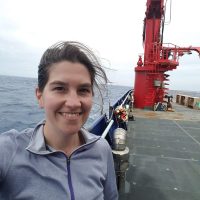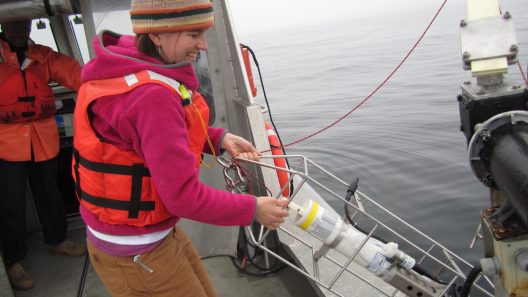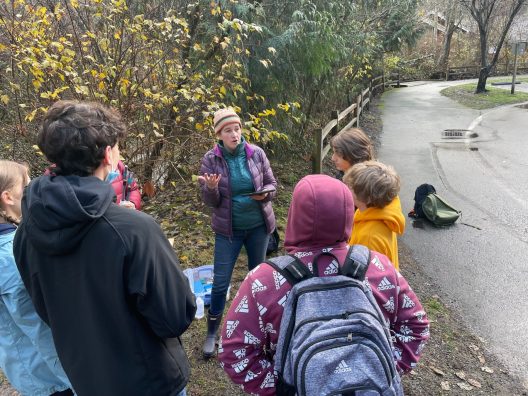The University of Washington School of Aquatic and Fishery Sciences and the School of Oceanography invite applications for a full-time (100% FTE), 9-month, non-tenured faculty position at the level of Assistant or Associate Teaching Professor in the broad field of marine sciences. Primary teaching responsibilities will be in the Marine Biology program at the University of Washington field station, Friday Harbor Laboratories (FHL). The program offers a Bachelor of Science Degree (BS) in Marine Biology housed within the College of the Environment.
The Marine Biology degree is a collaboration between the School of Oceanography and the School of Aquatic and Fishery Sciences, in partnership with the Friday Harbor Laboratories. This collaborative relationship brings together faculty representing multiple dimensions of Marine Biology in a collegial and collaborative culture with many teaching and curriculum development opportunities. Students choose this program to better understand marine ecosystems and their importance to society. The program has grown rapidly since it was established in 2018 and now has over 370 majors.
The position will be based at Friday Harbor Laboratories for daily, in-person instruction. FHL offers rich immersive learning in coastal ecology, oceanography, marine biology, and marine conservation. FHL is about four hours’ travel north of the Seattle campus on the ferry-accessible San Juan Island. The site has excellent access to a variety of marine ecosystems and provides facilities for field and laboratory research and experiential student learning. The position offers a unique opportunity for leadership in the development of an innovative, hands-on, field-based curriculum to meet the growing needs of marine science majors.
The anticipated start date of the position is September 16, 2023. The Assistant or Associate Teaching Professor will be hired on renewable multi-year appointments with a 9-month service period (September 16 through June 15) that may allow for additional opportunities to teach or pursue research or other scholarly activities during the summer. The initial appointment will be for three years with a renewal decision at the end of year two. Although this position is not tenure-eligible, it includes faculty voting rights and a pathway for career advancement and promotion in rank. The base salary range for this position will be $8,000 to $11,000 per month, commensurate with experience and qualifications, or as mandated by a U.S. Department of Labor prevailing wage determination. Other compensation associated with this position may include a moving allowance, a relocation incentive, and/or limited commitment of summer salary in the first year.
All UW faculty engage in teaching, scholarship, and service. Our Teaching Professors are long-term educational professionals who combine instructional excellence with a variety of leadership, community building, outreach, advancement of pedagogy, and scholarship. The successful applicant will:
- Teach 4 – 6 courses per year (10-week quarter system) across all levels in the Marine Biology program, based in-person at Specific teaching responsibilities will take into account the candidate’s expertise and curricular needs and may include:
- Marine science courses that serve core needs in the Marine Biology program and take advantage of the unique educational opportunities at research-based courses aimed at upper division undergraduates in the Marine Biology major that promote independent investigation, interpretation, and
- Provide leadership in the direction of the FHL academic-year undergraduate curriculum, aimed at serving Marine Biology and other majors at the University of Washington; serve as the principal liaison between the FHL and main campus to provide opportunities for fulfilling Marine Biology major requirements; and support College of the Environment efforts to promote the growth of the teaching program at
- Advance educational scholarship in the teaching program with emphasis on innovative pedagogy and attention to diversity, equity, and This may include contributing to the growing community of pedagogical researchers within the College.
- Play an active role in the FHL, MB, College, and University community, for example, by engaging in shared governance, serving on key committees, contributing to the implementation of evidence-based practices throughout the instructional program and the training and mentoring of teaching
Positive factors for consideration include but are not limited to candidates with demonstrated experience in marine science field research, a demonstrated record of curriculum design at the undergraduate level, use of pedagogical innovation, mentoring of undergraduates, and/or demonstrated teaching effectiveness in upper division undergraduate courses
Our Schools strive to create an inclusive and welcoming environment where people of all backgrounds, who bring a range of perspectives and life experiences, are welcomed, heard, and supported. We acknowledge that if the marine sciences do not adequately reflect the diversity of national and local populations, then marine science, policy and management are much less likely to reflect the knowledge, interest, and will of stakeholder. The successful candidate will be expected to contribute substantially to our efforts. We encourage applications from candidates from underrepresented groups.
Qualifications:
Applicants must have a Ph.D. degree, or foreign equivalent, in the biological marine sciences or a related field by the start date of the appointment. In addition, candidates must have a minimum of three years experience as a teaching faculty at the Assistant and/or Associate professor level.
Application Instructions:
Applicants are asked to describe plans for innovative and high-quality teaching and scholarship that contribute to an inclusive and equitable campus environment. We are committed to a holistic review of applicants, recognizing that applicants have varying life circumstances, pandemic experiences, and access to resources. Broad categories to be considered during the reviewing process include an applicant’s research expertise and accomplishments, record and vision for innovative teaching, potential to advance diversity, equity, and inclusion (DEI), and leadership potential at the UW. To apply, applicants should upload the following materials to Interfolio https://apply.interfolio.com/118322 (a cover letter is not requested and will not be included in the review process):
- a curriculum vitae that includes educational background, positions held, teaching and mentoring experiences, leadership experience, service and engagement, relevant experience with DEI (diversity, equity and inclusion) related activities, funding awarded, a list of publications (including those under review) and The CV should also include the names, affiliations, and contact information for three references who can address some aspect of the candidate’s scholarly accomplishments, teaching record, potential to advance DEI, and leadership potential. Letters will only be requested for shortlisted candidates.
- a teaching statement (maximum 2 pages). This statement is an opportunity for the applicant to articulate their teaching philosophy and reflect on their formal and informal teaching experiences, reflections on formative teaching moments, evidence of improved performance over time, and implementation of teaching It may also include educational mentoring experiences, experience with evidence-based teaching, approaches to inclusive teaching, and a plan for how they might contribute to the Marine Biology program at a field station. More information can be found by examining the requirements of our undergraduate degrees; Marine Biology, Aquatic and Fishery Sciences, Oceanography, as well as courses offered at Friday Harbor Laboratories. The teaching statement should include an appendix with one sample syllabus, one peer teaching evaluation (if available), and a one-page summary of quantitative student evaluations.
- a scholarship and leadership statement (maximum 2 pages). This statement is an opportunity for the applicant to outline the strength and creativity of their research accomplishments in the marine sciences and its relevance for teaching at In addition, candidates could outline their experience in the scholarship of teaching and learning (including, for example, funded education research projects, peer-reviewed publications, publication of white papers and teaching material, curriculum and course development, presentations, and undergraduate mentoring). The statement should also include the applicant’s broad vision for future scholarly work in pedagogy and undergraduate student mentoring as part of this position. Finally, the statement should detail their leadership experience in the above and other educational activities and initiatives; for example, in committee management, curriculum design, and student recruitment.
- a diversity, equity, and inclusion (DEI) statement (maximum 2 pages). This statement is an opportunity for the applicant to highlight experiences with enhancing diversity, equity, and inclusion in academic and other settings, and to describe future goals and specific ways applicants might help or lead efforts to advance the major’s commitments to DEI.
Questions regarding the application process or any potential disability accommodations during the application and interview process can be directed to the Search Committee Chair: Prof. Lorenz Hauser, lhauser@uw.edu.
Review of applications will begin on January 31, 2023 (Priority deadline). Applicants who submit all required documents by this date are guaranteed full consideration. Applications received after the deadline will be reviewed on a weekly basis at the discretion of the search committee until the position is filled or closed.
Equal Employment Opportunity Statement
University of Washington is an affirmative action and equal opportunity employer. All qualified applicants will receive consideration for employment without regard to race, color, creed, religion, national origin, sex, sexual orientation, marital status, pregnancy, genetic information, gender identity or expression, age, disability, or protected veteran status.
Commitment to Diversity
The University of Washington is committed to building diversity among its faculty, librarian, staff, and student communities, and articulates that commitment in the UW Diversity Blueprint (http://www.washington.edu/diversity/diversity-blueprint/). Additionally, the University’s Faculty Code recognizes faculty efforts in research, teaching and/or service that address diversity and equal opportunity as important contributions to a faculty member’s academic profile and responsibilities (https://www.washington.edu/admin/rules/policies/FCG/FCCH24.html#2432).
COVID-19 Vaccine Requirements and Information
Under Washington State Governor Inslee’s Proclamation 21-14.1 (https://www.governor.wa.gov/sites/default/files/proclamations/21-14.1%20-%20COVID- 19%20Vax%20Washington%20Amendment.pdf), University of Washington (UW) workers must be fully vaccinated against COVID-19 and provide proof thereof, or receive a UW- approved medical or religious exemption. This requirement will be a condition of any offer associated with this recruitment. For more information, please visit https://www.washington.edu/coronavirus/vaccination-requirement/.

 We spoke with Rosalind Echols, who gained her PhD from the School of Oceanography in Spring 2022 and is now pursuing her Postdoctoral Scholar studies at SAFS, as part of our Spotlight Series. Our Spotlight Series showcases the researchers at SAFS, how they got here, and the impact their research is having on the wider world.
We spoke with Rosalind Echols, who gained her PhD from the School of Oceanography in Spring 2022 and is now pursuing her Postdoctoral Scholar studies at SAFS, as part of our Spotlight Series. Our Spotlight Series showcases the researchers at SAFS, how they got here, and the impact their research is having on the wider world.
